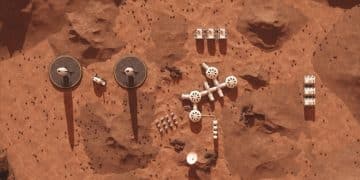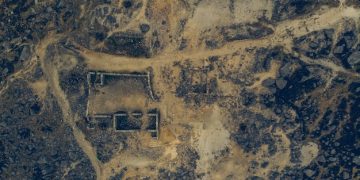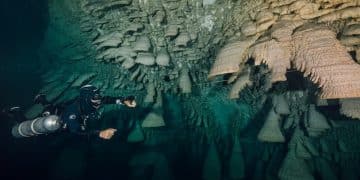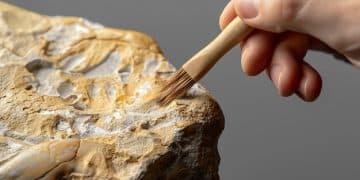Unearthing History: The Role of Citizen Scientists in US Archaeology
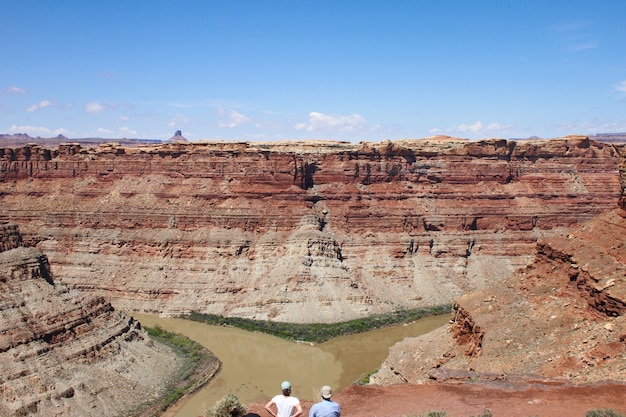
The Role of Citizen Scientists in Archaeology: How Volunteers Are Contributing to Discoveries Across the US is becoming increasingly vital, providing essential support to professional archaeologists and broadening public engagement with historical research and preservation efforts across the United States.
Archaeology, often perceived as the domain of trained professionals, is experiencing a transformative shift, thanks to the enthusiastic participation of citizen scientists. The Role of Citizen Scientists in Archaeology: How Volunteers Are Contributing to Discoveries Across the US is undeniable, offering a unique opportunity for individuals to actively contribute to the unearthing of our shared past.
But just how significant is this contribution, and what impact are these dedicated volunteers making on archaeological research in the United States? Let’s delve into the fascinating world where passion meets shovel, revealing the incredible discoveries being made with the help of ordinary citizens.
Understanding the Rise of Citizen Science in Archaeology
Citizen science, in its essence, democratizes the scientific process, allowing individuals without formal training to participate in research. In archaeology, this movement has gained considerable traction, offering invaluable assistance to researchers and fostering a deeper appreciation for our cultural heritage.
But what factors have fueled this rise of citizen science within the archaeological community?
The Benefits of Citizen Involvement
One key driver is the sheer scale of archaeological work needed. Limited resources and vast landscapes often hinder comprehensive research, making the assistance of volunteers indispensable. Consider these advantages:
- Increased manpower: Volunteers significantly expand the workforce available for excavation.
- Cost-effectiveness: The utilization of volunteers helps reduce overall project costs.
- Community engagement: Citizen science fosters a sense of ownership and responsibility toward preserving local heritage.
- Data Collection: Citizen scientists can assist in cataloging, photographing, and archiving artifacts.
Technological Advancements
Technology plays a critical role by facilitating citizen participation by providing the communication and collaboration tools. Smartphones, GPS, and online databases like citizen science portals have revolutionized how data is collected, analyzed, and shared.
Therefore, the integration of these technologies enable volunteers to contribute meaningfully from anywhere, anytime, making archaeological projects more accessible and engaging than ever before. Combining accessibility with training yields effective participation.
In conclusion, the rise of citizen science in archaeology marks a major change in how the field accesses and processes its work. It combines the advantages of many hands with the ever growing accessibility of new technology.

Key Archaeological Projects Benefiting from Volunteer Contributions
Across the United States, numerous archaeological projects bear testament to the remarkable impact of citizen scientists. Their dedication and enthusiasm have been instrumental in uncovering valuable insights into the nation’s past.
But how exactly are volunteers making such a significant difference? Let’s explore some specific examples.
The Crow Canyon Archaeological Center
Located in southwestern Colorado, the Crow Canyon Archaeological Center has long been a pioneer in engaging citizen scientists in archaeological research. Volunteers participate in excavations, artifact analysis, and educational programs, contributing to a greater understanding of the ancestral Pueblo people.
George Washington’s Mount Vernon
At George Washington’s Mount Vernon, citizen scientists have played a crucial role in uncovering the history of the estate’s enslaved community. Participating in archaeological excavations, volunteers have unearthed artifacts that shed light on the lives, experiences, and resilience of those who lived and labored at Mount Vernon.
The National Park Service
The National Park Service (NPS) engages volunteers in various archaeological projects across the country. These projects range from surveying historic battlefields to excavating prehistoric sites. The Role of Citizen Scientists in Archaeology: How Volunteers Are Contributing to Discoveries Across the US in these contexts is especially impactful, promoting a sense of stewardship and responsibility toward national heritage.
The key to success for all of these programs is making complex data accessible to community volunteers to make them feel included. The archaeological record, in all its intricacy, also needs to be understandable by the everyday person.
In conclusion, these projects provide tangible proof of the invaluable role citizen scientists play in archaeological discovery across a diversity of situations, environments, and eras in US history.
The Skills and Training Required for Citizen Scientists
While enthusiasm is essential, citizen scientists also require specific skills and training to ensure the accuracy and integrity of archaeological work. Providing adequate preparation is crucial for both the volunteers and the success of the project.
So, what knowledge and abilities are necessary for effective participation?
Essential Skills for Volunteers
Archaeological excavation is more than just digging. Volunteers should develop proficiency in areas like:
- Excavation techniques: Careful removal of soil layers.
- Artifact identification: Recognizing and classifying different types of artifacts.
- Documentation: Accurate recording of finds and their contexts.
- Data analysis: Assisting in the interpretation of collected data.
Training Programs and Workshops
Many institutions offer comprehensive training programs for citizen scientists like universities and archeological centers. These programs equip volunteers with the necessary knowledge and skills to contribute effectively to archaeological projects. Training can be hands-on in the field, classroom settings, and digital tools. In addition, online resources like tutorials and virtual field trips are available.
Ensuring Ethical Conduct
Ethical considerations are paramount in archaeology. Citizen scientists must adhere to strict guidelines, respecting the integrity of archaeological sites and the cultural heritage they represent. Projects should inform volunteers about guidelines related to handling artifacts, respecting cultural sites, and accurately recording findings.
With the correct implementation of training and ethical considerations in mind, volunteers can contribute to a field that requires care and precision.
To summarize, citizen scientists must develop a diverse skillset, receive proper training, and adhere to high ethical standards in order to continue in their important role.
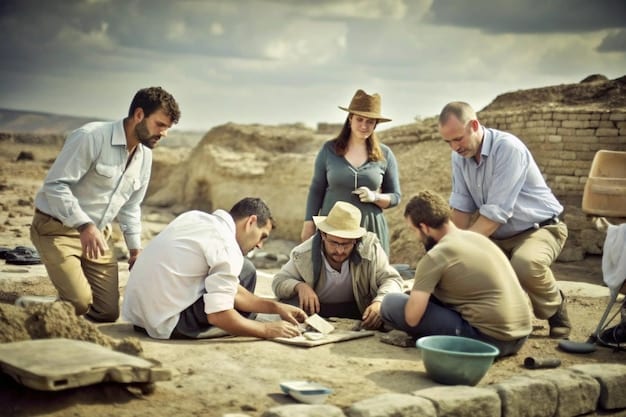
Challenges and Opportunities in Citizen Science Archaeology
While the involvement of citizen scientists in archaeology offers tremendous benefits, it also presents unique challenges and opportunities that must be carefully navigated.
What are the primary hurdles that need to be addressed, and what potential avenues can be explored to further enhance the role of volunteers?
Maintaining Data Quality and Accuracy
Ensuring that data collected by citizen scientists is accurate and reliable is of utmost importance. Data management and cross-checking protocols play a pivotal role in this area. Implementing clear data protocols and validation processes increases that data is useful to projects. In addition, tools for data cleaning and consistency are advantageous.
Bridging the Gap Between Professionals and Volunteers
Effective collaboration between professional archaeologists and citizen scientists is key to successful projects. Mutual respect and understanding can be improved by fostering opportunities for collaboration such as workshops, public events, and field trips.
Expanding Access and Diversity
Efforts should be made to broaden participation in citizen science archaeology, ensuring that opportunities are accessible to individuals from diverse backgrounds and communities. Outreach can be used to target and inform diverse populations. Removing barriers that prevent participation improves overall equity.
By embracing strategies like diverse leadership, improved training and tools, and expanding diversity we make the field of archeology accessible.
In short, strategic plans and an eye toward progress makes citizen science a growing field in archeology.
The Future of Citizen Science in Archaeological Research
As technology continues to advance and public interest in archaeology grows, the role of citizen scientists in archaeological research is poised to expand even further.
What innovative trends and developments can we expect to see in the coming years?
Leveraging Technology for Greater Impact
Emerging technologies such as artificial intelligence (AI) and virtual reality (VR) have the potential to revolutionize citizen science archaeology. Automated data analysis and engaging virtual reconstructions can enhance volunteer experiences.
Expanding Educational Opportunities
Online courses, interactive simulations, and virtual field trips can broaden access to archaeological education and training. These educational programs empower citizen scientists to make increasingly sophisticated contributions.
Fostering Global Collaboration
Virtual platforms and online communities can facilitate collaboration among citizen scientists and researchers from around the world. Combining the minds and efforts from across the globe can yield great discovery.
Through continued innovation, ethical research and volunteer work can further expand and continue to develop in the field.
In conclusion, the future of citizen science in archeology has great potential through technology, education, and collaboration.
| Key Point | Brief Description |
|---|---|
| 🧑🤝🧑 Volunteer Impact | Volunteers enhance archaeological projects by increasing research capabilities, expanding educational programs, and fostering preservation. |
| 📚 Training | Essential skills are taught through programs ensuring scientific accuracy and ethical conduct. |
| 🌐 Tech Integration | Technology like accessible platforms and digital tools are helpful to access and process work. |
| 🚀 Future Expansion | Expansion occurs through tech, more education, and collaboration. |
Frequently Asked Questions
Citizen scientists assist professional archaeologists through a variety of tasks such as excavation, artifact cleaning, documentation, and identifying artifacts. They do not need to have any previous skills to join.
Volunteering for an archeology project can be fulfilling through helping to preserve our cultural heritage while being an active participant. This is also a great opportunity to learn new skills, meet people, and explore new places.
Training for citizen scientists typically includes hands-on excavation techniques, artifact identification and documentation, and data analysis. Ethical conduct and respect for cultural sites are also emphasized.
Yes, citizen scientists should adhere to strict guidelines regarding the handling of artifacts, respecting cultural sites. Accurate documentation of findings is essential to ensure the integrity of archaeological work.
Technologies like GPS, online catalogs, virtual reality, etc., can help aid citizen projects. These technologies can automate data analysis in ways that were only options for professionals in the past.
Conclusion
The Role of Citizen Scientists in Archaeology: How Volunteers Are Contributing to Discoveries Across the US shows how public involvement can affect archaeological discoveries. By offering workforce skills and engaging with modern technology, citizen scientists help uncover, record, and safeguard our shared past.
As we move forward, prioritizing thorough training, ethical behavior, and diversity will be vital for fully utilizing the potential of volunteers in US archaeological activities.

